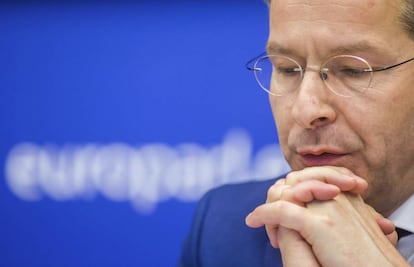Eurogroup chief’s “liquor and women” jibe “unfortunate:” Spain’s economy minister
Dijsselbloem offers qualified apology after over comments taken as insulting southern Europe
Indignation in southern European countries keeps growing following recent statements by the head of eurozone finance ministers, Jeroen Dijsselbloem, which have been described as racist, sexist and xenophobic.

Spain’s economy minister, Luis de Guindos, has called the statements “unfortunate” and insisted that Dijsselbloem should regret having made them.
The prime minister of Portugal, Antonio Costa, went further and said that the Eurogroup leader should resign over his words. “Mr Dijsselbloem must disappear,” said Costa.
In an extensive interview with Germany’s Frankfurter Allgemeine Zeitung, the Dutch finance minister said the following: “The north of the eurozone showed solidarity with the countries in crisis. As a social democrat, I consider solidarity extremely important. But those demanding it have duties too. I can’t spend my money on liquor and women and then ask for help. This principle applies at the personal, local, national and even European level.”
I am sorry my message was misunderstood and taken as North against South Jeroen Dijsselbloem, Eurogroup chief
Asked about these statements in the hallways of Spanish Congress, Luis de Guindos on Wednesday said that he found them “unfortunate in form and content.”
The Spanish economy minister also lamented the fact that Dijsselbloem shows no desire to go back on his words. “I was hoping he would have regretted it,” said De Guindos.
Late on Wednesday, Dijsselbloem offered a qualified apology saying: “I am sorry that my message was misunderstood and that it was taken as North against South. I apologize if anyone feels offended.”
“What I said is no one can misspend their money and then expect financial assistance,” attributing the misunderstanding to his “direct” style which is “part of Calvinist culture”, and to his “Dutch sincerity.”
“Many European countries, including those of the South, have carried out sweeping reforms in recent years. This effort should continue: there is no room for complacency,” added the Eurogroup chief.
Time for change
The controversy comes at a time when Dijsselbloem’s own political position is very weak. His Labor Party lost 29 of its 38 seats at last week’s election in The Netherlands, which in turn could affect Dijsselbloem’s position as Eurogroup chief. Although it is not a written rule, this group has always been led by a minister.
Dijsselbloem’s term is due to run out in January 2018, and for now he will continue in the post. But political maneuvering is already taking place in the sidelines to see who will be next to occupy his seat. “In principle, I am not a candidate to head the Eurogroup,” said De Guindos, who competed with Dijsselbloem for the post in 2015.
Spanish Economy Minister Luis de Guindos described Dijsselbloem's comments as unfortunate in form and content
While De Guindos has not openly asked for the Eurogroup chief’s resignation, other Spanish politicians have, including Esteban González Pons, a member of the European Parliament with the Popular Party (PP).
English version by Susana Urra.
Tu suscripción se está usando en otro dispositivo
¿Quieres añadir otro usuario a tu suscripción?
Si continúas leyendo en este dispositivo, no se podrá leer en el otro.
FlechaTu suscripción se está usando en otro dispositivo y solo puedes acceder a EL PAÍS desde un dispositivo a la vez.
Si quieres compartir tu cuenta, cambia tu suscripción a la modalidad Premium, así podrás añadir otro usuario. Cada uno accederá con su propia cuenta de email, lo que os permitirá personalizar vuestra experiencia en EL PAÍS.
¿Tienes una suscripción de empresa? Accede aquí para contratar más cuentas.
En el caso de no saber quién está usando tu cuenta, te recomendamos cambiar tu contraseña aquí.
Si decides continuar compartiendo tu cuenta, este mensaje se mostrará en tu dispositivo y en el de la otra persona que está usando tu cuenta de forma indefinida, afectando a tu experiencia de lectura. Puedes consultar aquí los términos y condiciones de la suscripción digital.









































